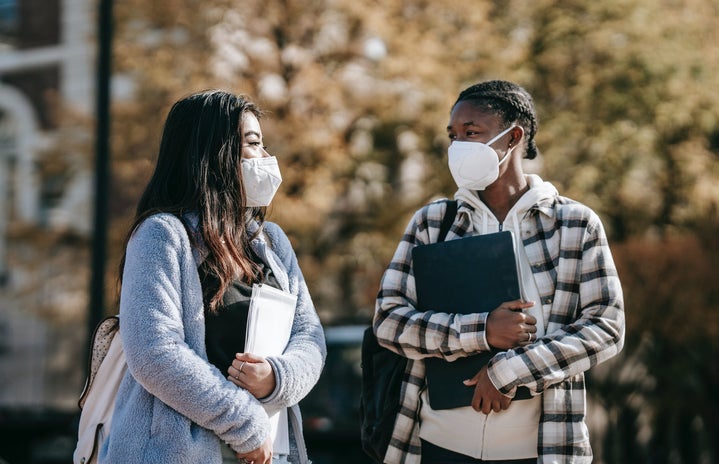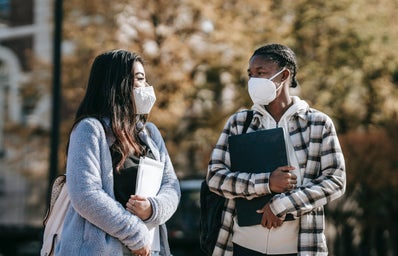The Her Campus National Editors write about products we love and think you’ll love too. Her Campus has affiliate partnerships, so we get a share of the revenue from your purchase. All products are in stock and all prices are accurate as of publication.
As someone who is still taking COVID-19 precautions, let me let you in on a little tidbit: I don’t want to wear a mask forever. I also don’t want to forever exist in a world where a highly transmissible virus is constantly circulating and debilitating people for long periods of time, or even indefinitely. Unfortunately, the world has largely moved on from this virus, content to pretend it doesn’t exist or “is just like a cold” – or more likely, being misinformed due to complete mishandling by public health officials. In short, COVID-19 is still very much present and very much a threat to everyone’s health (yes, even if you’re not immunocompromised).
It seems the outlook on COVID-19 shifted when vaccines were finally released. The world began to open back up and people began to feel a sense of security – prematurely. The anti-vaccine rhetoric that exploded around this vaccine didn’t help, but the first misstep was how vaccines were presented to the public. It wasn’t properly communicated that the protection vaccines offered would wane over time, nor that they did not offer 100% protection against infection. People now had to be convinced to get regular boosters, which many have not kept up with. While a large percentage of people received the initial dose, only around 20% of adults in the United States received the latest booster. Vaccines don’t offer perfect protection, but they are an important layer, and the fact that so few have felt compelled to stay boosted isn’t a good sign.
The biggest oversight when it comes to COVID-19 is Long COVID. The most significant change since the peak of the pandemic that people point to is that fewer people are dying and being hospitalized, but those were never the sole concerns. That being said, COVID-19 still kills an average of 1500 people per week, compared to 163 for the flu. The flu is certainly worse than a common cold, so what does that say about COVID-19? And even for those who don’t die from infection, Long COVID is still a threat. In fact, most Long COVID cases result from mild infection. Each reinfection increases one’s risk of developing Long COVID, even with multiple vaccinations.
Even with these statistics, many people have been lulled into a false sense of security. People who have not experienced chronic illness might struggle to conceptualize the impact it has on your life, and how seemingly out of nowhere it can appear. Having dealt with chronic illness since my early teenage years, I’d say I have enough experience under my belt to know that it sucks, and to avoid adding anything else to my plate at all costs. I’m not immunocompromised, but I don’t take my health for granted, nor my immune system, which COVID-19 can damage.
The voices we really need to center are those most at risk for severe infection and effects from COVID-19. Some people seem to think that anyone at higher risk of severe COVID-19 should just stay home. But the idea that immunocompromised and disabled people need to bear the full weight of keeping themselves safe from COVID-19 is honestly disgusting. Why is the world so willing to discard disabled and chronically ill people? There’s a clear message that they don’t deserve to live a life as full as anyone else because most people can’t be bothered to make lifestyle changes to make life accessible for everyone. Leaving those who face the most danger from COVID-19 behind was our biggest public health and societal failure, especially in medical settings. We’d actually all have to do a lot less if everyone did a little bit more. But our extreme individualism shows in the way that despite surviving a pandemic, many people can’t even do the bare minimum of wearing a mask when visibly sick.
There is good, or at least hopeful, news regarding COVID-19. Engineers are working on a nasal spray that could potentially prevent viruses from reaching our lungs at all. Clean air is significant in reducing COVID-19 infections, too, since air purifiers can reduce viruses in the air. Advocating for clean air is huge, and frankly, logical when we already recognize the importance of clean water, and would also protect us from worsening air quality due to the climate crisis. Just like wearing a high-quality respirator, the benefits are numerous – a respirator doesn’t just protect you against COVID-19, but other airborne illnesses as well, including the flu. Wearing one can help against allergies, too! We don’t think twice about daily precautions like wearing a seatbelt or wearing sunscreen, but these actions protect ourselves more than others while masking regularly does both.
But that brings us back to the question, if everyone has been convinced that everything is totally fine, what incentive is there to take advantage of these protections? It’s dangerous to act like we’re in pre-pandemic times and to make decisions that do nothing but increase people’s risk of getting ill. The world was in such a rush to move on that there was no exploration of sustainable protection, and now everyone is left to fend for themselves, while vaccines, tests, and even time off become less accessible to those who need them. Somehow we practiced more solidarity when we were all forced to bond over being quarantined, and now that we are free to convene, everyone has forgotten what community means.
Masking is community care in a world where most have abandoned the idea of taking care of each other and taking action against preventable diseases. None of us are invincible; take it from someone who knows the impacts of chronic illness. In retrospect, it was naive to think that we would ever return to a semblance of normal. We couldn’t have known that before, but we can acknowledge it now. The world has changed and so must we, and recognizing that is more likely to keep us all happy and healthy than to unsuccessfully force us back into business as usual.The pandemic could have or should have, dare I say, changed our outlook on contagious illnesses altogether. It’s actually really messed up that we accept thousands of deaths caused by the flu every year as inevitable, especially now that we know how to prevent them. The pandemic should have made us more compassionate, but I fear it made most people more selfish in their eagerness to return to normal. In a world that has stopped paying attention, I urge you to care.


